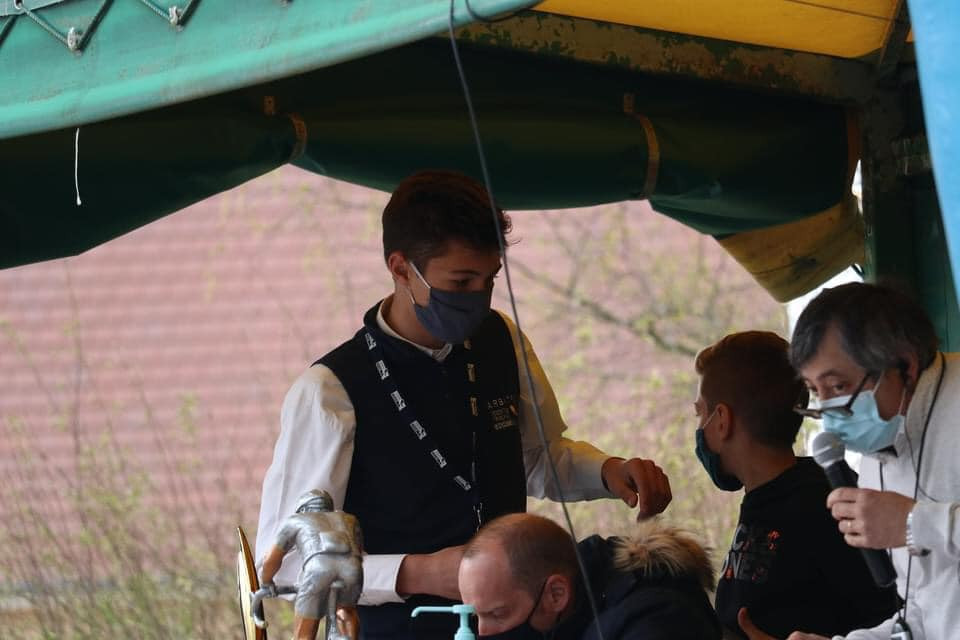This content was published on December 26, 2021 – 08:14
Olga Tokariuk
Kiev, Dec 26 (EFE) .- Thirty years after the disappearance of the USSR “Ukraine’s society is still paralyzed by fear and that hinders the development of the country,” says the prominent Ukrainian dissident Mykola Matusévych, who spent ten years in the Soviet gulag.
“Many of the brightest and best people were exterminated by the Soviet regime,” says Matusévych, who at 75 lives in a dilapidated house in the town of Vasylkiv, about 25 kilometers from Kiev, where he received Efe.
TEN YEARS IN PRISON AND WORK FIELDS
He endured ten years in prison, first in Perm (in the Urals), and then in labor camps in the inhospitable Chita region of Siberia on the Mongolian border, unlike many Ukrainian dissidents, such as the famous poet Vasyl Stus, who he died in prison in 1985, the year Mikhail Gorbachev headed the Soviet Union.
“There were Latvians, Lithuanians, Georgians, Armenians … The USSR was really a people’s prison,” says Matusévych, one of the founders of Ukraine’s Helsinki Group human rights organization, created in late 1976.
The dissident does not regret his decision to participate in the founding of the organization nor does he regret the years spent in the gulag.
EXAMPLE OF RESILIENCE FOR THE NEW GENERATIONS
“The ten idiots who dared to express their ideas openly, the co-founders of the Helsinki Group of Ukraine in the 70s, set an example of resilience to the new generations,” says veteran dissident with his characteristic ironic tone.
He adds that there will undoubtedly be attempts to restore the Soviet empire, but he is sure that “they will be doomed to failure.”
“Young people in Ukraine are now just as stubborn and stubborn as we once were,” Matusévych says.
THE HOLODOMOR, KEY INFLUENCE
He was born in the province of Kiev, into a family that suffered from the Holodomor, the artificial famine ordered by Soviet dictator Joseph Stalin in 1932-1933 in which at least 3.8 million Ukrainians died.
According to the dissident, his mother whispered the horrors of the Holodomor in his ear, which created his rejection of the Soviet regime and his support for an eventual independence from Ukraine.
“When you see injustice, when you see your oppressed people, you feel the urgent need to change things. I knew the regime would collapse. The only thing I was not sure of was that I would live to see it,” he adds.
THE CULTURAL FIELD, REFUGE OF DISSIDENCE
Expressing these views in the Soviet Union was extremely dangerous and the only way to show loyalty to things Ukrainian in a safe way was to join cultural initiatives.
Matusévych made contact with a Ukrainian choir called Homin, where he met like-minded people. “I just wanted to find people who cared about Ukraine, who spoke Ukrainian,” he explains.
Together with nine acquaintances from cultural circles – writers, poets, philosophers – he founded the Helnsiki Group of Ukraine in 1976, a year after the USSR signed the Helsinki Final Act, pledging to defend human rights.
THE FINAL ACT OF HELSINKI AND THE FIGHT FOR HUMAN RIGHTS
Dissidents and liberals in many Soviet republics saw in this a signal to denounce communist repressions and express their desire for national self-determination.
“We documented cases of human rights violations, we spoke openly with the people of the Holodomor”, Matusévych recalls,
The Helsinki Group of Ukraine was short-lived: five months after its creation, judicial persecution of its members began.
DETENTION AND CONDEMNATION
Matusévych was arrested in April 1977, along with his colleague and friend the philosopher Myrolav Marynóvych, the other of the two co-founders of the Group who is still alive, on charges of “spreading anti-Soviet propaganda.
He refused to testify and appear at the trial in which he was sentenced to 7 years in prison in a high security prison and five years in a labor camp.
“When we founded the Helsinki Group of Ukraine we were aware that we could be arrested and sent to prison. It was only a matter of time. So I was not surprised when they came for me. I just told the officer: ‘I will not go until I finish my café ‘”, recalls the dissident. EFE
ot-bsi / ig
(Photo)
© EFE 2021. The redistribution and redistribution of all or part of the contents of Efe’s services is expressly prohibited, without the prior and express consent of Agencia EFE SA
–


